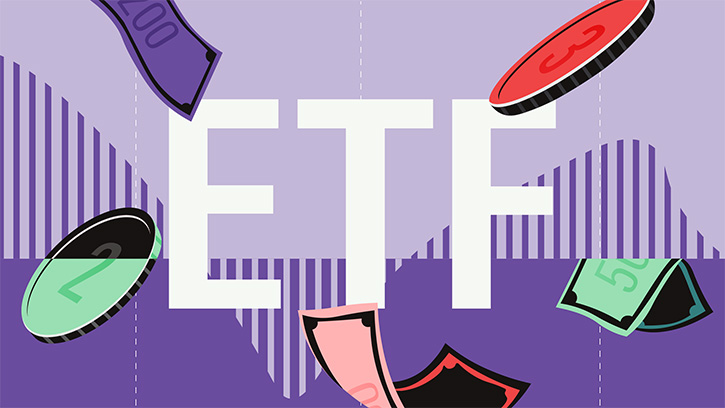
We've already looked at the best- and worst-performing funds and trusts of 2023; now we continue this period of retrospection with a look at exchange-traded funds (ETFs) last year.
We can now reveal that cryptos and digital assets topped the performance list of ETF themes both last month and throughout 2023.
Top Performing 2023 ETFs in Europe
With a stunning 255% return, the top exchange-traded product (ETP) of 2023 was the VanEck Crypto & Blockchain Innovators ETF A USD Acc (DAPP). This was closely followed by another three ETF exposed to blockchain, including the Global X Blockchain UCITS ETF USD Acc (BKCH).
Indeed, with the exception of two trackers exposed to the semiconductor industry and one thematic strategy on the metaverse (all of them at the bottom of the top performer list), the whole ranking is dedicated to digital assets and cryptocurrencies.
The past year has seen the resurgence of crypto, with Bitcoin (BTC) up almost 160%. At the time of writing it is currently priced at $45,339 (£35,657). There's also some altcoins in the ascendancy, of which Solana (SOL) is the front runner, gaining around 1,000%.
Meanwhile, progress is being made on the Securities and Exchange Commission's (SEC) approval of the first spot ETF on Bitcoin in the US. In December, the SEC reportedly met with representatives of at least seven companies that intend to launch spot ETFs on Bitcoin in early 2024, including BlackRock, Grayscale Investments, ARK Investments and 21Shares.
Many crypto investors also believe the launch of such a product would open the door to institutional investment and be a bullish catalyst for the market.
For the time being, US authorities have approved several ETFs trading futures contracts on Bitcoin and Ethereum but have so far repeatedly rejected applications for spot ETFs. The SEC argues spot crypto ETFs are unsafe for investors due to the market's vulnerability to manipulation and volatility. Speculation is now rife the US regulator is on the verge of shifting its policy, however.
Bottom Performing 2023 ETFs
At the other end of the performance scale, the laggards of 2023 include instruments exposed to natural gas and industrial metals like rhodium, nickel, and palladium.
The US natural gas market (Henry Hub) has been pushed down by record production and forecasts of mild weather this autumn, which kept heating demand low and allowed utilities to continue injecting gas into storage. Even Europe, where stocks are at capacity, will have to deal with a possible resurgence in energy prices this winter.
For its part, rhodium is, along with iridium, the rarest non-radioactive metal on Earth, and its value is closely linked to the automotive industry. Production is being affected by political and industrial dysfunction in South Africa, where 83% of the world's output is concentrated. Rhodium is used in catalytic converters for petrol and diesel cars, aircrafts, and nuclear reactors.
Finally, solar stocks suffered overall last year, but they did bounce back slightly in December. Despite the boom of solar energy, especially in Europe, solar companies have been negatively impacted by a number of factors ranging from material costs, permission delays, high interest rates to political uncertainty in key markets. In this article, we analysed the "solar paradox".
Best December ETF Performers
There are about 83 percentage points between the best- and worst-performing ETPs in December (our list excludes inverse and leveraged funds), with returns for the month ranging from 52.6% to -21.2%.
December's ranking largely mirrors that of the entire year, with blockchain and digital asset products leading the way.
The December Laggards
Meanwhile, the worst-performing ETF in December was WisdomTree Sugar ETC (SUGA), exposed to the fluctuations of sugar, with a monthly loss of 21%. This is likely due to profit-taking – sugar had risen about 40% in the first 11 months of the year.
We then find trackers exposed to other soft commodities such as soybean, as well as natural gas, and to the Turkish stock exchange. Turkish stocks suffered in December as a central bank intervention in the currency market failed to stem the lira's decline amid surging inflation in the country. The currency has come under pressure after the central bank cut its benchmark repo rate by a percentage point to 14%, despite inflation accelerating to over 21%.




























